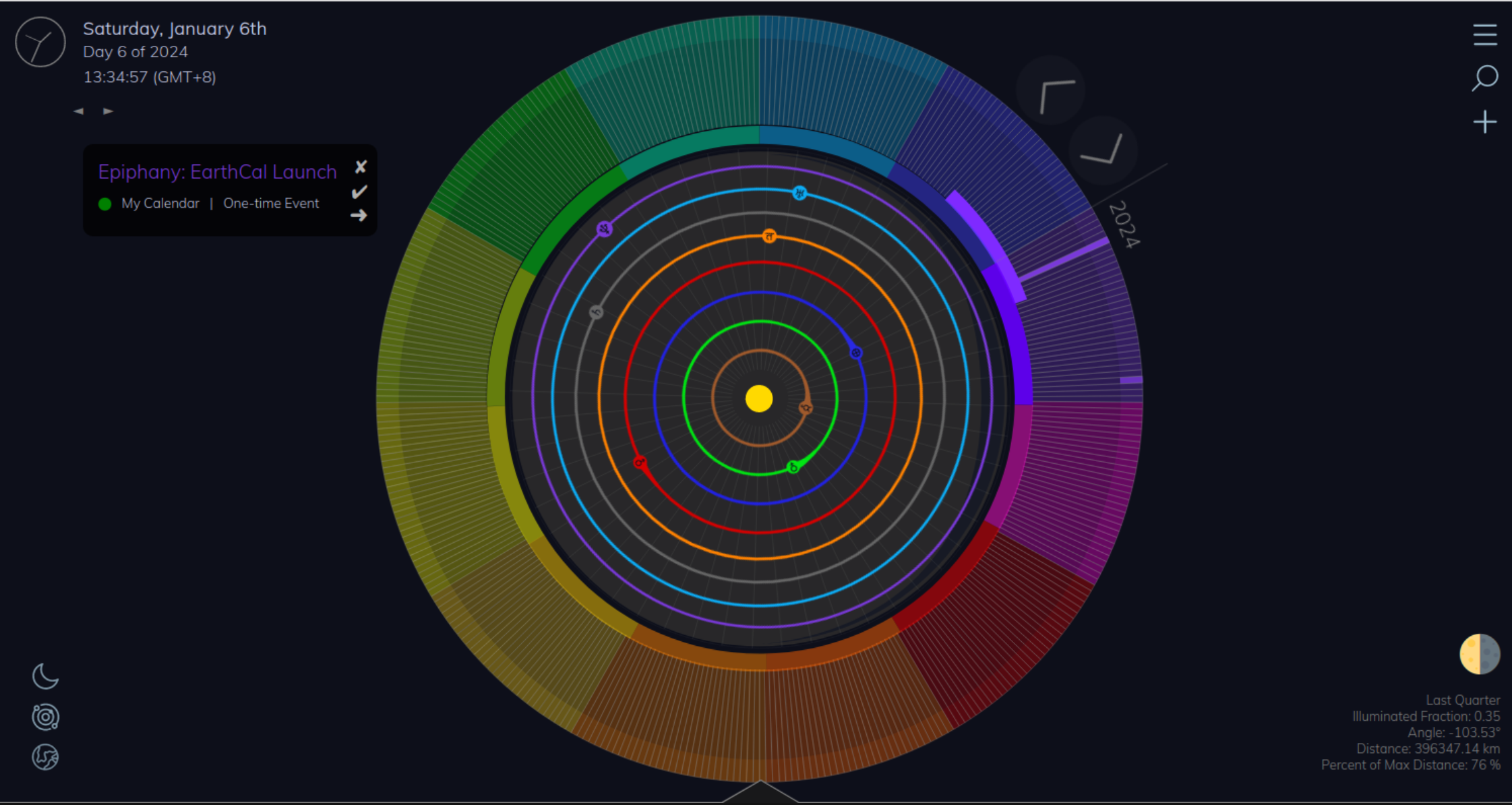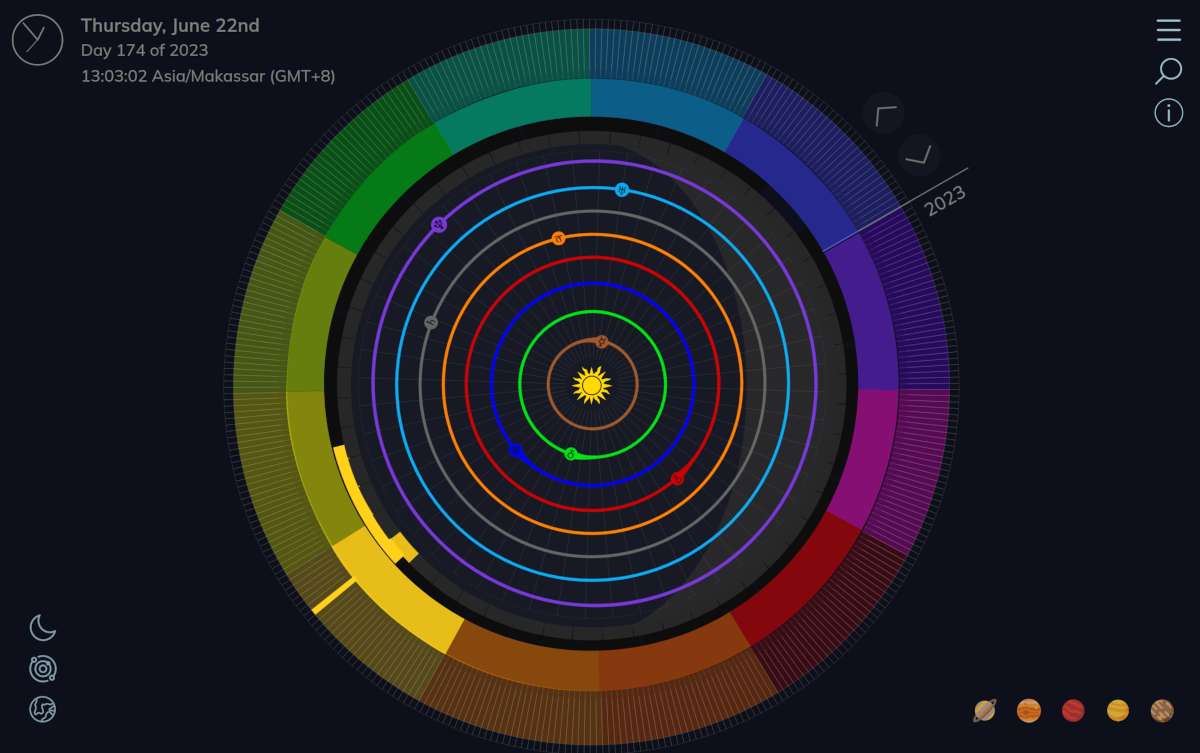Introducing EarthCal
An online, dynamic version of the EarthCycles circular calendar: EarthCal is now online and available in the snap store.

Introducing the online, dynamic version of the EarthCycles circular calendar!
Ever since the first print version of the EarthCycles calendar was published in 2021 I've had the dream of making a dynamic version. Over the last year, I've used this vision as an excuse to explore the latest artificial intelligence programing tools.
With a little AI help, once insurmountable orbit calculations, astronomical data access and vector animations have become... surmountable! Programing an entirely dynamic version of the original EarthCycles calendar became possible.
7,270 lines code later... EarthCal is now live.
EarthCal
For those of you familiar with the print version of the EarthCycles calendar, this is a big level up.
EarthCal is the app version of the printed EarthCycles calendar many of you have come to enjoy.
That's right, this version provides an online dynamic, interactive and animated access to the cycles of the earth, the moon, the planets and select migrations!
Why EarthCal?
Even more than the print version, EarthCal enables you to break out of the archaic regimen of time that is cemented into the Gregorian calendar that we use today.
If you didn't know, every day when we use virtually any modern calendar (from wall calendars, to google, to outlook) we're referencing the 500 years old Gregorian calendar system. In 1582, Pope Gregory ordained an update to the Julian calendar (that one going back to the time of Julius Caesar!).
In the 16th century, the Catholic Church still held a view of the universe in which humanity was central and that the sun and planets spun around Earth. As such, the Gregorian calendar is mainly monocyclic. In other words, it is primarily based on just one cycle: the solar cycle. It is also primarily anthropocentric. For example, although the Gregorian calendar references the lunar cycle, it is primarily as a way to make sense of human cycles and celebrations– such as deciding the date of Easter each year.
This representation and experience of time and reality is fundamentally different from that of many of other civilizations. For example, the Greeks and the Mayans incorporated the cycles of Venus into their tracking of time. Meanwhile, many other civilizations incorporated the cycles of other creatures into their cultural rhythms and tracking of time.
In my own experience and research, I've observed a correlation between the amount of cycles tracked by a society and its ecological integration.
As you know, maximizing our ecological integration is a principle theme for me and for Earthen.
And it is the inspiration for EarthCal!
During my time living among the Igorots, the indigenous people of Northern Luzon in the West Philippines sea, I was struck by their very different way of seeing and tracking time. You can read more about the philosophical and anthropological foundation for EarthCal in the Tractatus Ayyew and the 1959 paper by anthropologist William Henry Scott, Some Calendars of Northern Luzon.

What is EarthCal?
EarthCal is in fact a simple one page website– or web app– that is freely accessible by anyone, anywhere at https://cycles.earthen.io
EarthCal is best used on a desktop computer. However, a fully functional mobile version will automatically load for phones and tablets. You can access it here:

And if you are an Ubuntu user, great news! The Linux standalone app (no need for an internet connection) can be installed from the snap store:

EarthCal is currently in beta– meaning there's lots of improvements still to realized.
However, its core features are 100% functional:
- View the solar and months year as one interactive circle of 365 days
- See the real-time positions of all the planets for the current day or any other date +-5 years in the past or future.
- Search for any date to see the real-time positions.
- View the orbital speeds of the planets by click animation.
- View the phase of the moon with real-time scroll
- View the phases of Venus and Mars with real-time scroll (Mercury coming soon!)
- View the astronomical status data of Venus, Mars, Jupiter and Saturn with real-time scroll (Mercury coming soon!)
- View the migratory cycle of the pacific ocean grey whale with real-time scroll (ruby throat humming bird, porcupine cariboo, monarch butterfly and Canada goose cycles coming soon)

Track your own Cycles and Events
Like any good calendar EarthCal isn't just about visualizing the passage of time. You can also use EarthCal to keep track of your daily events and annual events. Select any day to add events and items to do that day. Or, add an annual repeating event to any day.
Personally, I use my EarthCal as day to day to-do list. I also use it to keep my schedule of events and to record birthdays of family and friends.
Check it out and follow the project
This is the first public release of EarthCal. That means, over the next year it will improve a lot! From more migration cycles, to better mobile support to better day-to-day event management, to Google calendar sinking, we'll keep you up to date with any major updates through the Earthen newsletter. If you haven't already...
Meanwhile, be sure to check out EarthCal itself and give it a spin!




